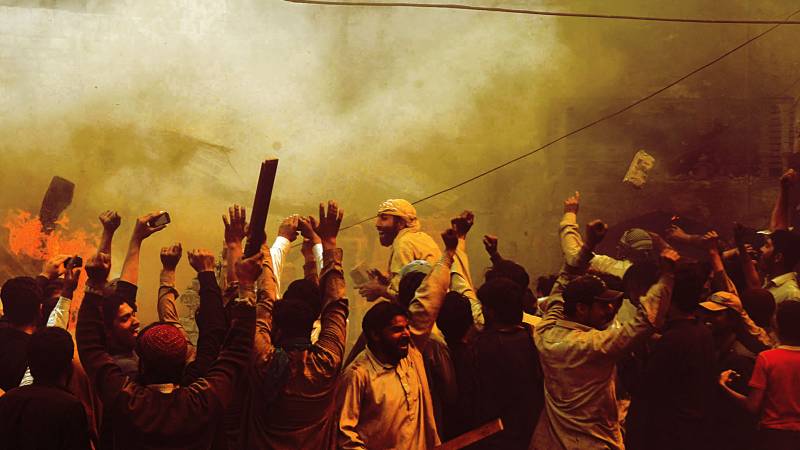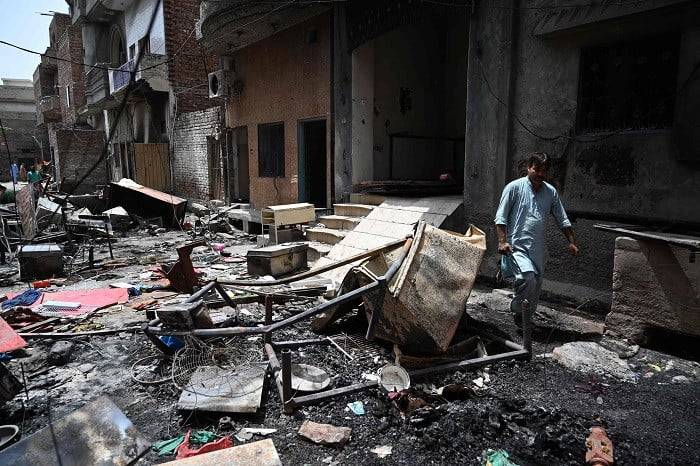
In a world that increasingly celebrates diversity and inclusivity, Pakistan presents a stark and troubling contrast. Instead of celebrating the colorful tapestry of cultures, religions, and ethnicities, Pakistan's religious minorities and ethnic groups face persistent discrimination and danger. Despite the visionary leadership of Pakistan's founder, Muhammad Ali Jinnah, who ardently advocated for freedom, equality, and minority rights, today's reality paints a grim picture for many minorities, where acceptance and safety remain elusive dreams.
The plight of Christians: Mob lynching over blasphemy allegations
In the heart of Pakistan, where diversity should flourish, a grim reality shatters the dream of freedom and equality for all. Religious minorities such as Christians, Hindus, Sikhs, and others constantly fear persecution; their lives are precarious due to extremist abuse of blasphemy laws. One haunting tale from Sargodha on August 25, 2024, echoes the horrors of our time—the story of an 80-year-old Christian, Lazar Masih, brutally tortured by a mob and later succumbed to his injuries at the hospital, his factory reduced to ashes, and his family subjected to unspeakable torment—physically and emotionally. Under the guise of defending religious honor, the perpetrators took the law and legislation into their own hands without conducting a thorough investigation into the case. The scenes were horrific when his property was being burned; he was being brutally tortured with stones and being called by the derogatory term “Chora.”

As these atrocities unfolded, many in Pakistan were preoccupied with advocating for human rights in distant lands, such as Palestine (that is absolutely needed, though), while ignoring the human rights violations happening in their own backyard. This selective activism highlights a disturbing trend: the inability or unwillingness to address the injustices faced by minorities within Pakistan.
Previous alleged blasphemy incidents
This is not the first time that a violent mob has attacked a Christian community, an individual, or a house. A violent mob set fire to an entire Christian community in Jaranwala less than a year ago. Miscreants vandalized over 90 houses and around 20 churches, desecrating numerous copies of the Holy Bible, the Book of Psalms (Zaboor), the Torah (Turait), and the Gospel (Injeel). Everyone saw this as a genuine act of blasphemy, yet it went unnoticed and unmonitored by blasphemy laws, which primarily enable Muslims to safeguard their religious sentiments. A disctrimination at its apex!

Delving deeper into the grim reality, Pakistan has witnessed a multitude of alleged blasphemy cases that shake the foundations of justice and humanity. The haunting echoes of incidents such as the Shanti Nagar tragedy, the Gojra riot, which claimed six innocent Christians and around 60 homes, and the Joseph Colony attack reverberate through our collective conscience. These atrocities, fueled by baseless allegations and religious fervor, have left scars on communities and shattered the sanctity of places of worship. Yet, what adds salt to these wounds is the stark absence of accountability. The perpetrators roam free, their actions unpunished, while the victims and their families continue to bear the weight of injustice.
The Crucial Role of Christian Contributions in Pakistan's Founding Vision
Christian contributions and Pakistan's founding vision epitomize the heartbeat of a nation forged on the principles of unity and diversity. The irony is palpable as we reflect on Pakistan's history, where the decisive votes of Christian leaders played a pivotal role in shaping the country's destiny. Motivated by Jinnah's vision of a harmonious nation, Christians and other minorities stood at the forefront of Pakistan's emergence, believing in a land where all religions could coexist and thrive. Since its inception, Christians have been instrumental in Pakistan's development, particularly in vital sectors like health and education, which account for 50–60% of its overall developmental ratio. Institutions like St. Mary's School, St. Joseph's, Cathedral Schools, Convent Schools, Forman Christian College, and Kinnaird College stand as beacons of excellence, nurturing generations of leaders who have left an indelible mark both nationally and globally.
Discriminatory job ads
Despite global trends where diversity is promoted and applicants of all races, genders, and nationalities are encouraged to apply for prestigious positions like PhDs, postdocs, and professorships, Pakistan lags behind. Shockingly, job ads in Pakistan sometimes openly favor specific religious affiliations, even going as far as preferring the Christian community for positions as sweepers.

Why has the minority population declined from 23% to just 3%?
Why has Pakistan's minority population plummeted from 23% to a mere 3%? How did a diverse nation, born with the promise of freedom and equality for all, with the decisive vote of the Christian minority, witness such a drastic decline in its minority communities? Who bore the brunt of the persecution, forced displacement, and violence that led to this alarming decrease? These haunting questions echo through Pakistan's history, revealing deep-rooted systemic issues that continue to plague its minorities.
If all the minorities are driven away, who will be the next target? Perhaps to the majority! As we confront this reality, we must delve deeper into the forces that have eroded the very fabric of inclusivity and diversity that Pakistan once celebrated.
The imperative of embracing true diversity
True diversity transcends mere tolerance; it celebrates the vibrant mosaic of races, cultures, and religions that coexist within a society. It involves acknowledging and honoring the contributions of all communities, ensuring their safety, and safeguarding their rights. In Pakistan, this ideal remains a distant dream.
To realize the inclusive vision of its founding father, the incumbent government must take decisive steps to protect religious minorities, uphold their rights, and celebrate their invaluable contributions. Only by doing so can Pakistan truly become a nation that embodies the values of diversity and harmony that Jinnah envisioned.
An urgent call to protect the endangered 3% minority
Diversity in Pakistan is not merely about religious tolerance; it is about embracing the nation's rich and multifaceted identity. The harrowing tales of persecution and violence against minorities serve as stark reminders of the immense work that remains. Pakistan can truly honor its founders' legacy and build a future that genuinely celebrates diversity by confronting these issues head-on and striving for a more inclusive society.
Now is the critical time to revisit and reform the blasphemy laws and their execution, as well as develop new policies that ensure religious freedom and protect the nation's minorities. The time for action is now—the government must stand against extremism and foster an environment where every citizen, regardless of their faith, feels safe and valued.
The urgency to act cannot be overstated; the future of Pakistan's diverse identity depends on it.

